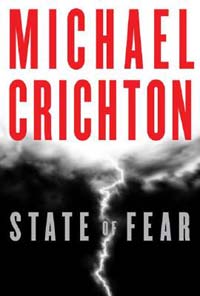 Se c'è un libro che questa estate i cittadini di TocqueVille non possono permettersi di ignorare è Stato di Paura di Michael Crichton, ancora meglio se nella versione originale in inglese. Non si tratta del solito, splendido thriller dell'autore di Andromeda, Jurassic Park, The Lost World, Timeline, Rising Sun, Disclosure e Congo. In comune con i lavori precedenti di Crichton, oltre ad essere scritto in modo divino (700 pagine vanno giù lisce come vodka&pesca in un paio di giorni), conserva l'eccellente lavoro di ricerca e di ambientazione caratteristico del Crichton-team e naturalmente un plot che sembra fatto apposta per essere trasformato, senza troppi sforzi, in una solida sceneggiatura cinematografica. Ma quello che fa salire State of Fear almeno un gradino al di sopra della narrativa contemporanea commerciale è, incredibilmente, il suo devastante ed inequivocabile messaggio politico. Sì, perché il libro di Crichton è un poderoso, dettagliato e coraggiosissimo atto d'accusa nei confronti del fondamentalismo ambientalista, con tanto di grafici, note a piè di pagina e bibliografia (Bjørn Lomborg è senz'altro l'autore più citato). In State of Fear, insoma, i "cattivi" sono i dirigenti e gli avvocati delle associazioni ambientaliste, gli eco-terroristi e gli attori di Hollywood che vanno in giro per il mondo (su jet privati super-inquinanti) per difendere le foreste tropicali dall'attacco delle multinazionali. Moribondi, in corso d'opera, restano sul terreno alcuni dei miti più imbarazzanti dell'ecologismo radicale: dalle teorie sul global warming a quelle sull'esaurimento delle risorse naturali. Imperdibili, poi, la postfazione e l'appendice in cui Crichton paragona la teoria pseudo-scientifica del surriscaldamento globale a quella, sempre pseudo-scientifica, dell'eugenetica in voga all'inizio del ventesimo secolo. Nessuna scusa, dunque, uscite di casa e precipitatevi in libreria. State of Fear è il libro dell'estate. Anzi, dell'anno.
Se c'è un libro che questa estate i cittadini di TocqueVille non possono permettersi di ignorare è Stato di Paura di Michael Crichton, ancora meglio se nella versione originale in inglese. Non si tratta del solito, splendido thriller dell'autore di Andromeda, Jurassic Park, The Lost World, Timeline, Rising Sun, Disclosure e Congo. In comune con i lavori precedenti di Crichton, oltre ad essere scritto in modo divino (700 pagine vanno giù lisce come vodka&pesca in un paio di giorni), conserva l'eccellente lavoro di ricerca e di ambientazione caratteristico del Crichton-team e naturalmente un plot che sembra fatto apposta per essere trasformato, senza troppi sforzi, in una solida sceneggiatura cinematografica. Ma quello che fa salire State of Fear almeno un gradino al di sopra della narrativa contemporanea commerciale è, incredibilmente, il suo devastante ed inequivocabile messaggio politico. Sì, perché il libro di Crichton è un poderoso, dettagliato e coraggiosissimo atto d'accusa nei confronti del fondamentalismo ambientalista, con tanto di grafici, note a piè di pagina e bibliografia (Bjørn Lomborg è senz'altro l'autore più citato). In State of Fear, insoma, i "cattivi" sono i dirigenti e gli avvocati delle associazioni ambientaliste, gli eco-terroristi e gli attori di Hollywood che vanno in giro per il mondo (su jet privati super-inquinanti) per difendere le foreste tropicali dall'attacco delle multinazionali. Moribondi, in corso d'opera, restano sul terreno alcuni dei miti più imbarazzanti dell'ecologismo radicale: dalle teorie sul global warming a quelle sull'esaurimento delle risorse naturali. Imperdibili, poi, la postfazione e l'appendice in cui Crichton paragona la teoria pseudo-scientifica del surriscaldamento globale a quella, sempre pseudo-scientifica, dell'eugenetica in voga all'inizio del ventesimo secolo. Nessuna scusa, dunque, uscite di casa e precipitatevi in libreria. State of Fear è il libro dell'estate. Anzi, dell'anno.«Dobbiamo continuare a fare pressione. E' per questo che ho fatto questa cosa con i ragazzi. Sarà un filmato di sicuro effetto per la campagna contro il cambiamento radicale del clima. E credo anche che sia andato benissimo. Lei che ne dice?»
«Abbastanza bene, tutto considerato.»
«Tutto considerato?»
«Considerato che erano tutte stronzate»
Il sorriso gli si gelò sulle labbra, ma socchiuse gli occhi. «Non sono sicuro di capire a cosa si sta riferendo», disse.
«Mi sto riferendo a tutto quanto. All'intero discorso. Le sequoie sono sentinelle e guardiani del nostro pianeta? Hanno un messaggio per noi?»
«Be', sì...»
«Sono alberi, Ted. Grossi alberi. E hanno un messaggio per l'umanità quanto può averlo una melanzana.»
If there is a book that TocqueVille's citizens cannot afford to ignore, that is "State of Fear" by Michael Crichton, better in the original English version. It is not just the usual, wonderful thriller by the author of Andromeda, Jurassic Park, The Lost World, Timeline, Rising Sun, Disclosure and Congo. It shares with the preceding works by Crichton, other than the divine writing style (700 pages go down as smoothly as a vodka&peach in a couple of days), the excellent work of research and localization that is a real trademark of the Crichton-team and of course a plot that seems built just to be transformed, without much effort, into a solid film script. But what raises "State of Fear" at least one step above the other commercial novels is, incredibly, its devastating and unmistakable political message. Yes, because Crichton's book is a powerful, detailed and extremely courageous accusation against environmental fundamentalism, rich in charts, footnotes and bibliography (Bjørn Lomborg, without any doubt, the most cited author). In "State of Fear", in short, the "bad guys" are the managers and lawyers of the environmental agencies and lobbies, the eco-terrorists and Hollywood stars that raid the world (using super polluting private jets) to defend tropical forests from the attacks by multinational corporations. Dying, in the development of the action, lay on the ground some of the most embarrassing myths of radical ecologism: ranging from the theories on global warming to those concerning exhaustion of natural resources. Further on, it cannot be missed the postface and the appendix where Crichton compares the pseudo-scientific theory of global warming to the theory, as well pseudo-scientific, of eugenetics that was very popular at the beginning of the 20th century, No excuses, then: get out of home and rush to the bookstore. "State of Fear" is the book of the summer. Moreover: of the year.

Nessun commento:
Posta un commento